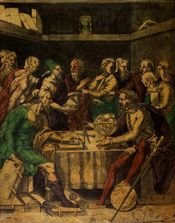|
|
You are not currently logged in. Are you accessing the unsecure (http) portal? Click here to switch to the secure portal. |
Difference between revisions of "Johannes Suvenus"
Jump to navigation
Jump to search
| Line 39: | Line 39: | ||
| below = | | below = | ||
}} | }} | ||
| − | '''Johannes Suvenus''' (Johane dicto suueno) was a 14th century [[fencing master]] of uncertain nationality, though his name probably indicates that he came from the Swabia region of Germany (''Suevia'' in Latin).<ref name="Mondschein 11"> | + | '''Johannes Suvenus''' (Johane dicto suueno) was a 14th century [[fencing master]] of uncertain nationality, though his name probably indicates that he came from the Swabia region of Germany (''Suevia'' in Latin).<ref name="Mondschein 11">Mondschein, Ken. ''The Knightly Art of Battle''. Singapore: Getty Publications, 2011. p 11.</ref><ref name="Cvet">Cvet, David M. "[http://www.ejmas.com/jwma/articles/2008/jwmaart_cvet_0908.htm A Brief Examination of Fiore dei Liberi's Treatises Flos Duellatorum & Fior di Battaglia]". ''[[Journal of Western Martial Art]]''. Electronic Journals of Martial Arts and Sciences, 2008. Retrieved 2009-02-15.</ref><ref>It's worth noting that there does seem to have been a small town in Italy named Suveno, which is a valid alternative point of origin. See Matt Galas, http://www.swordforum.com/forums/showthread.php?90889-Mexinensis-Messina.</ref> The only record of his existence comes from the introduction to the [[Flos Duellatorum (Pisani Dossi MS)|Pisani Dossi]] version of [[Fiore de'i Liberi]]'s [[fencing manual]], ''The Flower of Battle''. Liberi describes him as his principal teacher among the many German and Italian masters he studied with, and states that Suvenus was himself a student of [[Nicholai de Toblem]].<ref name="dei Liberi Pisani Dossi">[[Fiore de'i Liberi|Liberi, Fiore de'i]]. ''Flos Duellatorum'' [manuscript]. [[Flos Duellatorum (Pisani Dossi MS)|Pisani Dossi MS]]. Italy: Private Collection, 1410. f 1r.</ref> |
== References == | == References == | ||
Revision as of 17:37, 25 March 2014
| Johannes Suvenus | |
|---|---|
| Born | 14th century Swabia, Germany (?) |
| Died | 14th century (?) |
| Occupation | Fencing master |
| Influences | Nicholai de Toblem |
| Influenced | Fiore de'i Liberi |
Johannes Suvenus (Johane dicto suueno) was a 14th century fencing master of uncertain nationality, though his name probably indicates that he came from the Swabia region of Germany (Suevia in Latin).[1][2][3] The only record of his existence comes from the introduction to the Pisani Dossi version of Fiore de'i Liberi's fencing manual, The Flower of Battle. Liberi describes him as his principal teacher among the many German and Italian masters he studied with, and states that Suvenus was himself a student of Nicholai de Toblem.[4]
References
- ↑ Mondschein, Ken. The Knightly Art of Battle. Singapore: Getty Publications, 2011. p 11.
- ↑ Cvet, David M. "A Brief Examination of Fiore dei Liberi's Treatises Flos Duellatorum & Fior di Battaglia". Journal of Western Martial Art. Electronic Journals of Martial Arts and Sciences, 2008. Retrieved 2009-02-15.
- ↑ It's worth noting that there does seem to have been a small town in Italy named Suveno, which is a valid alternative point of origin. See Matt Galas, http://www.swordforum.com/forums/showthread.php?90889-Mexinensis-Messina.
- ↑ Liberi, Fiore de'i. Flos Duellatorum [manuscript]. Pisani Dossi MS. Italy: Private Collection, 1410. f 1r.

